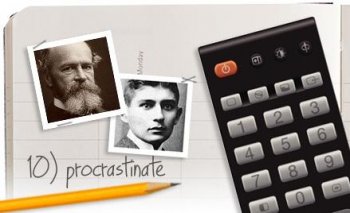
 So far, this series makes musicians and artists sound awfully industrious. They get-up at 4 a.m., skip dishes, and just take amphetamines to give their particular effective hours. Perhaps the nap-lovers grow to be workaholics. It reminds me personally of a quote by V. S. Pritchett, from an essay about the English historian Edward Gibbon. Pritchett writes, “Sooner or later, the fantastic men grow to be all alike. They never ever are amiss. They never drop a minute. It's Very discouraging.”
So far, this series makes musicians and artists sound awfully industrious. They get-up at 4 a.m., skip dishes, and just take amphetamines to give their particular effective hours. Perhaps the nap-lovers grow to be workaholics. It reminds me personally of a quote by V. S. Pritchett, from an essay about the English historian Edward Gibbon. Pritchett writes, “Sooner or later, the fantastic men grow to be all alike. They never ever are amiss. They never drop a minute. It's Very discouraging.”
It is discouraging. Happily, it is also untrue. Many great guys (and ladies) slacked down periodically, and some had been downright lazy—at least area of the time. (Edgar Allan Poe: "i'm exceptionally slothful, and splendidly industrious—by matches.") In exploring routine Rituals, I took unique enjoy finding stories about procrastination, both because i will be responsible of the habit myself and because I suspect that a certain amount of procrastination may be beneficial to your innovative process.
Franz Kafka is a great example. In 1908, Kafka landed a situation during the Workers’ crash Insurance Institute in Prague, where he had been lucky is regarding coveted “single change” system, which designed workplace hours from 8 or 9 each day until 2 or 3 within the afternoon. It was a distinct enhancement over his previous task, which needed very long hours and regular overtime. So just how performed Kafka make use of these newfound hours of freedom? First, lunch; then a four-hour-long nap; then ten full minutes of workout; then a walk; then dinner together with family members; and then, eventually, at 10:30 or 11:30 through the night, a few hours of writing—although most of this time had been invested composing letters or diary entries.
Inside the letters, Kafka complained that their time work was keeping him straight back, but as Louis Begley contends in the excellent biographical essay on Kafka, this was really just a justification. Begley writes, "it's rare that writers of fiction stay behind their particular desks, in fact writing, for over several hours daily. Had Kafka had the opportunity to make use of their time efficiently, the work routine at the Institute would have remaining him with sufficient sparetime for writing. While he respected, the facts ended up being that he squandered time."
He was scarcely alone within. William James had been another persistent procrastinator. He told one of his true courses, “i am aware somebody who will poke the fire, set seats directly, choose dust specks from floor, arrange their table, snatch up a paper, remove any guide which catches his attention, cut their fingernails, waste the early morning anyhow, in a nutshell, and all sorts of without premeditation—simply due to the fact only thing he must attend to is the planning of a noonday session in formal logic that he detests."
On the other hand, the majority of us may possibly kill to get as little done as William James. Obviously, procrastination is effective in its own method. The Stanford philosophy professor John Perry is a proponent of structured procrastination, or preventing doing your primary jobs by dealing with less pushing (but still worthwhile) things lower in your to-do list.
That's one approach. But i do believe many music artists had a need to procrastinate merely to ratchet up the pressure, whipping on their own into a state of almost anxiety that, while detrimental to the nerves, is very good the work. The playwright Tom Stoppard has actually mentioned the only thing that really gets him to publish is fear—he has got to get “frightened enough to discipline myself on typewriter for consecutive bouts.” Edward Abbey expressed a related sentiment in a letter to his editor. “we hate obligations, obligations and dealing under pressure, ” he wrote. “But conversely, i love getting paid-in advance and I only work under some pressure.”
The secret is put things off sufficient to produce this force however such that you put on you to ultimately a nub—or fail to arrive at work at all. Maira Kalman is one musician who seems to have discovered this balance. Whenever she's on due date, she said in a message, she remains inside her studio alone for many regarding the day but will got completely for strolls and take pauses to completely clean or metal. “I procrastinate the ideal amount, ” she stated. We should all wish to perform some exact same.
RELATED VIDEO












